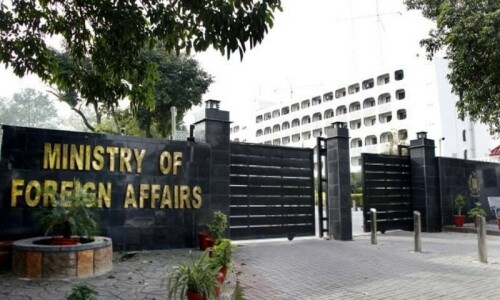ISLAMABAD: Secretary Climate Change Syed Abu Akif on Sunday said stemming the loss of biodiversity was vital for the poverty reduction and economic sustainability.
He pledged support to provincial governments and private organisations to protect biodiversity. The official was speaking at a three-day national awareness and training workshop on “Biodiversity conservation, access to genetic resources and fair and equitable sharing of their benefits under the United Nations Nagoya Protocol.”
“We must realise that the loss of biodiversity in all parts of the country has increased alarmingly and many wildlife and plant species are on the verge of extinction,” Mr Akif added.
The event coincided with the International Day for Biological Diversity that was also celebrated by the climate change ministry to highlight the role of biodiversity conservation for poverty reduction and achieving the United Nations’ 17 sustainable development goals. The goals were adopted on September 25 last year and are to be achieved by 2030.
The theme of the day this year was ‘Mainstreaming biodiversity, sustaining people and their livelihoods.’
The workshop and the biodiversity day event were organised by the ministry in partnership with the German Society for International Cooperation (GIZ) under its GIZ Biodiversity Khyber Pakhtunkhwa project and German Cooperation Organisation.
Mr Akif added: “We must understand that biodiversity is the foundation for the life and for the essential services provided by ecosystems. It ensures people’s livelihoods and sustainable development in all realms of socio-economic activity, including agriculture, forestry, fisheries and tourism.”
The gathering was informed that Pakistan provided habitats for 188 mammal species, of which six were endemic and 20 threatened with extinction. There are 666 bird species of which 25 are endangered. As many as 174 reptile species are found in the country, 13 of them ranked as endemic species. The reptiles include 14 turtles, one crocodile, 90 lizards and 65 species of snakes. Besides, there are 22 amphibians, nine of them declared endemic. Total 198 fresh water fish species exist in the country and 29 of them are endemics. So far, more than 5,000 species of invertebrates have been identified. In addition, there are over 5,700 species of flowering plants with over 400 species endemic in the country.
The country is also home to 26 national parks, 96 wildlife sanctuaries and 93 game reserve areas.
Other speakers said the increasing population, spontaneous, reckless urbanisation, deforestation and over-exploitation of natural resources were the main causes of the biodiversity loss.
The inspector general of forests, climate change ministry, Syed Mahmood Nasir, said biodiversity was an important cross-cutting issue in the 17 sustainable development goals.
“It is critical that we make progress on mainstreaming biodiversity and transforming how societies value and manage it,” said Mr Nasir.
Director biodiversity Raja Naeem Ashraf talked about the draft National Biodiversity Strategy and Action Plan.
He said the draft plan aimed at checking the biodiversity loss by conserving and protecting the wildlife and plant species, restoring ecosystems and promoting sustainable use of natural resources.
Wolfgang Hesse, the policy adviser of GIZ, spoke on the importance of the Nagoya Protocol on Access to Genetic Resources.
Published in Dawn, May 23rd, 2016













































